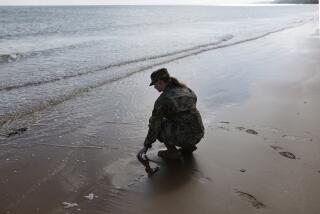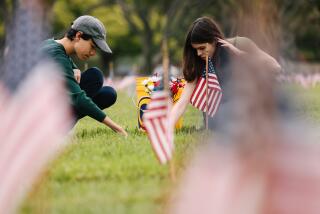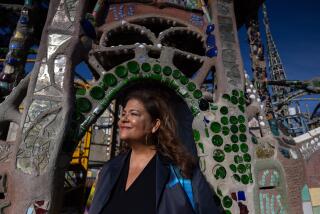‘Lest We Forget’
They do not speak what is in their hearts; it is too hard. Instead they stand there, quietly, among gentle shade trees that guard the gravestones. Many years ago, when they were practically teenagers, their hands shook with fear when the enemy was close. On this day, as the dark clouds come in, their hands shake because the men are old.
Many of them--the soldiers who fought in World War II--are dying now. This year, the soldiers say, they can feel it in their bones, aching from too many years of living, and from too many years of carrying somewhere deep inside all the blood and the roaring guns and the broken hearts.
“There really aren’t many of us left. They’re older; they’ve lived through a lot,” said Larry Laird, 77, of Yorba Linda, a member of the American Veterans Memorial Assn.
On Saturday at Fullerton’s Loma Vista Memorial Park, they planted simple white crosses and American flags, both for their own peace and to be witnessed by the children who had gathered. Maybe the children will not remember it tomorrow, but somehow, the veterans figure, it will come back to them.
“It’ll end up in books. If the parents or somebody’s grandparents bring their kids out there, it gives them something,” said Laird. “Or else it’ll just end up in books. It’s like Kipling: ‘Lest we forget.’ ”
All told, 300 people--volunteers, Boy Scouts, Girl Scouts, Vietnam veterans, Korean War veterans, even a young man wearing studded leather--came Saturday morning to put their memorials into the dirt, as if to somehow get closer to those buried there.
Every Memorial Day for the last 61 years, the American Veterans Memorial Assn. and the city of Fullerton have sponsored the event, and every year the veterans size each other up, looking for clues, to see if they were brave or if they would have let a good man die.
They talk of latrines, foxholes, latrines mistaken for foxholes, German missiles so fast that antiaircraft gunners could never hit them, unless they got lucky. Every year there are more crosses and flags and fewer World War II veterans, replaced by sons and daughters, some of whom are veterans themselves, and granddaughters.
Kathleen Faher, 2, placed more than 70 flags on veterans’ graves.
The gap is ages is remarkable: Two others are walking with Kathleen--her father, Richard, and her grandfather Don Dutton, 62, who is a Korean War veteran. He is amazed by the weight of it all. Stepping over graves, his eyes betray a reverence saved for other things, more private.
Richard Faher, having never experienced combat, stands over the gravestone of a man who surely flew a biplane. He is matter-of-fact, philosophical and touched in a way his father-in-law is not, seemingly struck more by the chronological history of it than by the misery. But there is nothing false in it: Don Dutton simply knew people who died, and Richard Faher did not.
As the morning closed, and the clouds moved in, a long-ago gunner named Dave Bell, 74, of Fullerton, stood sipping a cup of coffee. Wearing a brown suit, a brown hat and brown shoes, he seemed unable to look up from the ground. “I look out there [and] it makes me feel sad,” the man said. When he finally raised his eyes, a light drizzle had begun to fall.
More to Read
Sign up for Essential California
The most important California stories and recommendations in your inbox every morning.
You may occasionally receive promotional content from the Los Angeles Times.









